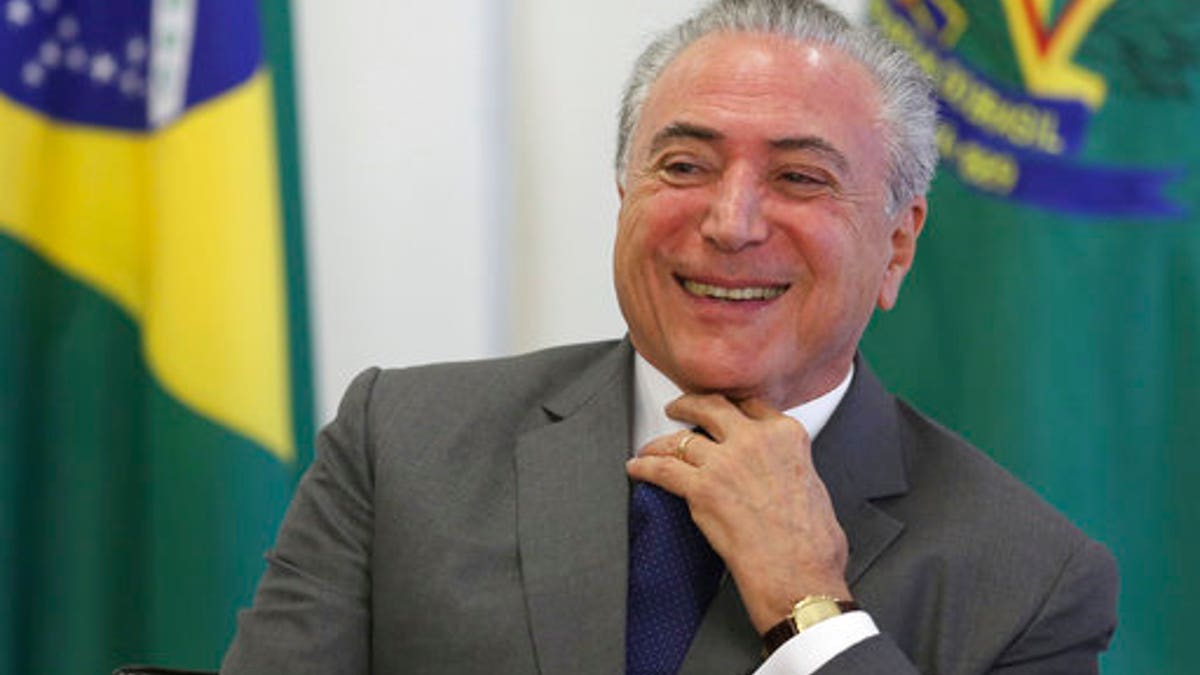
President Temer during a ceremony at the Planalto presidential palace, in Brasilia, Brazil, April 12, 2017. (AP)
BRASILIA – Brazil's Supreme Court on Thursday authorized an investigation into President Michel Temer and allegations that he condoned bribery of a potential witness in the massive "Car Wash" graft probe.
Temer denied any wrongdoing and strongly resisted growing calls for him to resign.
The news sent Brazilian stock and currency markets tumbling and raised doubts that Congress would pass Temer's austerity measures.
Temer's situation grew far more perilous after the Supreme Court officially approved an investigation into allegations against him, according to a source with direct knowledge of the decision.
BRAZIL REAL PLUNGES AGAINST DOLLAR AFTER REPORT PRESIDENT TEMER ENCOURAGED BRIBES
Also, a top court justice approved plea-bargain testimony and an audio recording that allegedly captured him conspiring to obstruct justice with Joesley Batista, chairman of meat company JBS SA. The approval allows the court to quickly make both the testimony and audio public.
Leaders of Temer's top allied party in Congress, the PSDB, said that if the allegations proved true, they would demand that three of their members who are in the president's cabinet resign.
Temer strongly denied allegations of wrongdoing and told allied lawmakers in a morning meeting that he would not be driven from office.
REPORT: BRAZIL PRESIDENT TAPED DISCUSSING PAYOFF FOR WITNESS IN GRAFT PROBE
"We need to see what the Supreme Court says and whether it accepts this tape as evidence," a presidential aide said. "The president is absolutely convinced he committed no crime, but that has to be made clear to the eyes of everyone."
Brazilian markets slumped on concerns that the investigation could derail Temer's economic and fiscal agenda. Shares of state-controlled companies, such as Banco do Brasil SA and Petróleo Brasileiro SA, or Petrobras, lost about a fifth of their value, and the nation's currency fell 7 percent, wiping out its gains for the year.
Brazil's Treasury and central bank said they stood ready to keep markets liquid and working properly.
Sergio Praça, a political scientist at Brazil's Getulio Vargas Foundation university, said Temer would have "zero chance of surviving this" once the audio recordings are released.
BRAZIL CRISIS DEEPENS WITH PROBE OF PRESIDENT, TOP SENATOR
"After that, it's difficult to say what will happen," Praça said. "But I believe that even if he resigns, the reforms, which are already before Congress, still have a good chance of passing in the medium term."
Some Temer allies tried to shore up confidence, but others said his Brazilian Democratic Movement Party, or PMDB, was in tatters.
"Nobody right now knows what to do or what is going to happen," said a senior aide to party leadership in Congress.
Federal police, meanwhile, closed in on Temer allies as they intensified their work in the three-year Car Wash investigation centering on billions in political kickbacks paid by Brazil's biggest construction companies in exchange for contracts at state-run oil producer Petrobras and other government enterprises.
Officers in the southern city of Curitiba searched the home of federal deputy Rodrido Rocha Loures, a longtime confidant of Temer and a member of the president's party. Loures is accused of receiving bribes on behalf of Temer, which he denies.
The O Globo newspaper reported on Wednesday night that Temer met with Batista in March.
Batista, who has secured a plea-bargain deal with prosecutors, recorded the conversation in which he and Temer allegedly discussed making illegal payments to jailed former House Speaker Eduardo Cunha, of the PMDB, to keep him from testifying about corruption.
Three people with direct knowledge of the investigation said the O Globo report was accurate.
JBS, which grew rapidly under 13 years of leftist Workers Party rule due largely to low-cost loans from Brazil's national development bank, said on Thursday that it had no comment on the situation.
